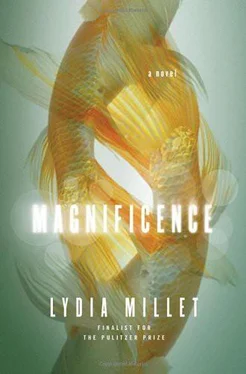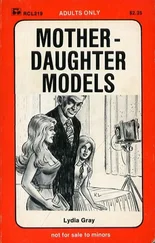It was unbearable that he should look so perfect, with what was coming to him next. Obscene. She leaned over the coffin and jerked his shirt up from under the pant waist.
The shirt cleared the belt line and she saw his stomach, a shade lighter than his face but still tan. What had he done there, down in the tropics? He must have been on the beach! She saw him walking into the surf, surveying the vast beyond. And there was the wound, the means of this ending. A small line. She reached out with fingers shaking and felt the bump of its lips against her finger pads. Life was a skin.
She would tell him she was sorry. Or no: too late. The body would not listen. It was a corpse, not him — but then it was him, it was. Wasn’t it? The last him she would know — the trace of him, the path he left. The raw materials. Or possibly all there was, all there had ever been. It was not hers to know; no one would let her in. The door of knowledge kept her out, her and legions, the masses of the undecided — the living ones, the ones who had been living and were not anymore — try as they might to look through the windows, they could not get in. You knew nothing of death, then you died.
People intended to make you feel better when they said the body was not the person, you or themselves, at least, but those were the ones who believed in the fields of hereafter, those who believed in cherubim. Their words presumed an independent mind, moving, roaming freely. If that were true, who knew how it might be, Hal’s mind floating untethered in this sterile room. Only herself for company. His mind and its murderer, her own. Maybe his mind was touching hers, in those infinite molecules of the air.
She willed her hands to rise, her arms to lift up, as though to feel the last of him going.
The cut was small. The cut was hardly there.
She pulled the shirt down after a while. She stood and looked and looked at him, the line of his nose and forehead, the eyebrows. But he would not say anything, and there was only so much looking she could do.

Though technically it was winter it felt like a mild spring day on the cemetery grounds. The service would be held in a steepled chapel called the Little Church of the Flowers, a name both quaint and faintly reminiscent of pederasty. Susan sat waiting in the first pew with Casey beside her at the end.
The venue had to be expensive, she thought — T. was paying, saying the funeral would be his responsibility — because it was an imitation of a church from Europe, an imitation of an English village church slapped down in the sunny, falsely green lake of Los Angeles County. Hal would have shaken his head at the pretension of it, but herself she found it pleasant enough. She didn’t mind the fake quaintness. She was not a snob when it came to authenticity. Whatever works, was the way she saw it. Whereas Hal had a tendency to mock his fellow Americans. He looked down from a high place on his countrymen, as he called them.
In his way Hal was an idealist. Had been. He had lofty ideas, where she only had pragmatism. She wondered if that made him more European. Also he had believed in taxes. Yes: though he’d grown up right here, though he had visited Europe only once, and even then in a bus full of low-budget tourists who yearned for nothing more than to step out of the bus in Paris and find the nearest McDonald’s, there were European aspects to Hal.
Sunlight filled the place with an excessive whiteness that made her blink when she looked up. Mourners were filing through the doors in surprising number but she didn’t know most of them — her own friends, her friends from college days, were far away and most hadn’t even heard the news. These were probably IRS employees, their equally unknown families in tow. Some were large, she noticed. Hal had never said his office was mostly overweight people, yet so it appeared to be. She’d never made a habit of dropping into his office, nor had she attended many office functions. And when she told Casey she would speak she hadn’t considered these mourners or their expectations. For their benefit she would have liked to be eloquent, but in the end she would not be. Of that much she was certain.
An arm’s length away Casey sat in her chair, head bowed. She did not wish to be spoken to. A few feet past her T. stood by a side door talking to a small man in black, the man who would officiate, Susan suspected — clerical-looking, nodding as T. spoke to him in a low murmur.
He did not say much — either that or Susan forgot to listen — and then Casey had intended to speak but could not, became choked up and had to roll back to her position at the end of the pew. Watching her made Susan wince but she had to get over it, she was up next herself, and she would have noticed her own nervousness if she had not been lost in feeling for Casey and the whine and the buzz. She had heard it from the moment T. told them Hal was dead: her life was full of background noise, a dull and droning clamor behind the voices or a ringing, a dreadful ringing like tinnitus that only diminished when she drank or smoked. Then things quieted and drew into focus.
It was not that she regretted all of it, only that she regretted this specific instance — that Hal had found out, that because of her carelessness he had seen. From that she’d failed to save him. This failure had driven him far away, and from far away came the man with the knife and slit his belly open.
She stood at the lectern with her eyes wide, as though shocked. As though she was stupid. She had an impression of clumps of flowers around her, wreaths and bouquets, white and purple and red, their cloudy colors on the margins, and wondered how she looked as the words flowed out of her, as she gazed down at her paper, which trembled slightly beneath her fingers. She held the paper and read the words, but the words did not say what she meant. She might look aged, widowed, dull, sharp, or blurred by grief. She felt suddenly like a vague being, a form without definition. She smoothed the paper on the lectern and glanced up from it — imprecise words — and out at the crowd, curious for a moment as to whether an ex had come. She hoped none had, of course. Robert, at least, was not here. She had told him it was over and he barely cared, she suspected, though he had seemed slightly annoyed. Inconvenienced, anyway. She cared even less than he did and wondered idly if T. would lay him off. T. had hardly dealt with him, didn’t know him at all.
She could barely discern the faces. She saw their pinkness or brownness and their sympathy, an unsmiling sympathy but sympathy all the same. They sympathized because they had no clue that she herself was the murderer. They did not know Hal had been murdered. Or not, at least, by her. They knew of the stabbing but not the real culprit.
Not one of them had the least idea who she was.
Luckily.

Afterward, in their stiff dress clothes, they drank. She did, and so did Casey and even, she thought, T., though he could apparently hold his liquor better than either of them. There was an open bar. People came up to her and she was conscious of feeling better the more she drank — magnanimous even. She would be intimate, she would confide in them. When if not now? She went out in a radius from Casey, made forays into the passing crowds from a station at Casey’s elbow. T. was drinking whiskey, a lock of his hair fallen over his forehead, his shirt unbuttoned. He was wearing a suit for the first time since he’d come back and had a debonair way about him, Susan thought, like a man from the roaring twenties.
Читать дальше













